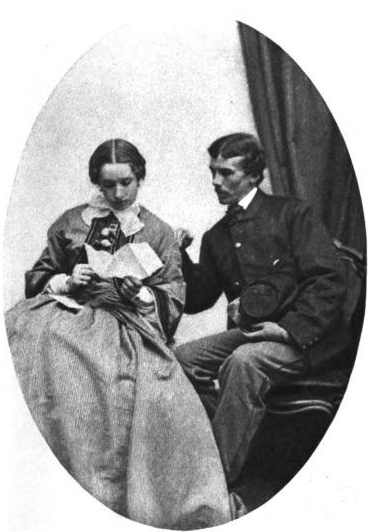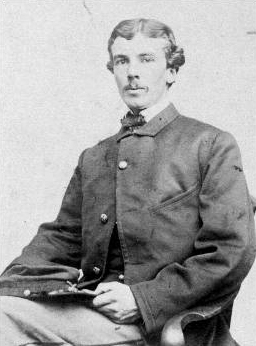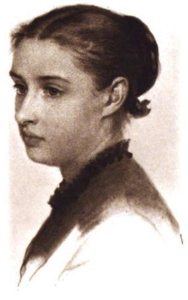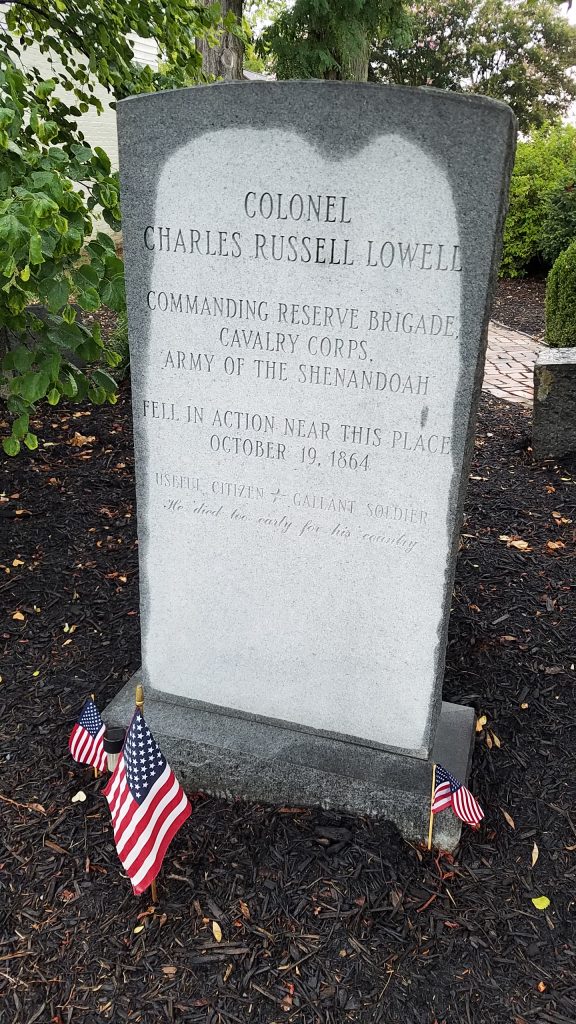Josephine Shaw Lowell: War’s Transformations
Adapted from my battlefield tour notes
Along the Valley Pike (Route 11) in Middletown, Virginia, just to the left of the historic Wayside Inn & Larrick’s Tavern, stands a granite monument to the memory of Colonel Charles Russell Lowell, Jr. This Union officer was mortally wounded during the battle of Cedar Creek on October 19, 1864, and he died the following day. The monument marks military service and battlefield death, but makes no mention of the effects of his fall.
Far from Middletown, his wife—Josephine Shaw Lowell—embroidered new shoulder insignia in anticipation of her husband’s promotion. The war had already up-ended her life and taken her beloved brother. In October 1864 and at just age 21, the war would transform her again.
Born on December 16, 1843, Josephine grew up with safety, privilege, and education. Her parents were wealthy, but pursued doing good in society, especially supporting the abolition movement. For a brief time, the Shaw family lived adjacent to Brook Farm, a transcendentalist agricultural commune experiment in Massachusetts; they also lived in Europe for several years, giving Josephine, her three sisters, and her older brother the opportunity to study abroad and become fluent in foreign languages.
By her early teens, she filled her days studying political economy, history and literature. After the Shaw family returned to America, a neighbor commented about Josephine’s habits: “She spoke French, German and Italian and, when I first knew her, was studying Latin and Greek, and reading philosophical books.” Perhaps with a mix of confusion and a little pride about his sister’s intellect, Robert Gould Shaw wrote: “Ask Effie to excuse me if I don’t fully understand everything she writes me. I will try to read up on Plato and Socrates, when I have time, and can get the books; her last [letter] fairly floored me.”
Josephine seemed inspired by her parents’ examples and the views of philosophers, artists, and writers that she interacted with socially in Massachusetts and New York. However, she also seemed to struggle with idealisms of thought versus the realities of life. The Civil War would put her idealisms to an ultimate test.
As the Civil War began in 1861, Josephine, her sisters, and female friends patriotically supported the Union’s war effort. She privately expressed disappointment that she could not enlist, but became a faithful correspondent to her brother, Robert, and numerous other cousins and friends in volunteer military service. She also ventured out and tried new organizational skills by joining the New York Women’s Central Association of Relief for the Army and Navy of the United States. This long-titled organization became a key component of the U.S. Sanitary Commission, and the civilians running the group collected donations—monetary and supplies—to send to Union regiments.
In the midst of her organizing and patriotic efforts, Josephine gained a new correspondent: Charles Russell Lowell, Jr. They had been acquainted for years since their families had mutual social circles, but by 1862, they had noticed each other with romantic interest.

Lowell had been born on January 2, 1835, and was nine years older than Josephine. He had graduated from Harvard in 1854, worked for iron companies and railroad, traveled Europe to recover from illness, and was a “decided enemy of slavery.” A deep thinker and moving in similar intellectual circles as the Shaw family, Lowell had a similar temperament to Josephine and they had many ideals and hopes in common. By late 1862, Lowell had battle experience from the Virginia Peninsula and the battle of Antietam with the 3rd U.S. Cavalry, and he was asked to recruit and prepare the 2nd Massachusetts Cavalry Regiment. During this recruiting time, Charles Lowell and Josephine Shaw reconnected and, according to family lore, got engaged after a whirlwind romance of nine visits. Exact details aside, the couple was engaged on March 5, 1863, to the delight of both their families. Lowell gave his fiancee a motto that he wrote for their engagement and as the foundations of their relationship: “In essentials, unity; – in non-essentials, freedom; in all things, love.”
The couple’s unity would be put to the test in 1863. Josephine’s older brother—Robert Gould Shaw—accepted command of the 54th Massachusetts Regiment, one of the first regiments of African American soldiers. Jospehine and Lowell witnessed the departure of that regiment from Boston, observing the parade on horseback. One eyewitness remembered they “came whirling up on horseback, and drew up close behind to where I was standing among the crowd of spectators. I looked back and saw their faces and figures against the evening sky, and they looked so young and victorious…” A few months later, the Shaw family received the tragic news: Colonel Shaw had been killed in the assault on Fort Wagner in South Carolina on July 18, 1863. He was buried with his fallen African American soldiers, leaving the family without funeral closure, but seeing his death as a martyr-type sacrifice. Lowell tried to comfort Josephine, writing about Shaw: “The manliness and high courage of such a man never die with him. They live in his comrades.”
On October 31, 1863, Josephine Shaw married Colonel Lowell. She moved to Vienna, Virginia, settling up quarters near her husband’s cavalry camp to spend the winter. Lowell bragged that his wife was the “Commander in Chief” saying “she is not such a veteran as Halleck, but I think she can manage men better, in the field or anywhere else.” During the winter of 1863-1864, the Lowells were known for their hospitality and often seen riding through camps and around the countryside together. Josephine filled her alone hours with reading, volunteering at a nearby hospital, teaching freedmen to read and write, and penning letters for illiterate soldiers. Her fluency in French, Italian, and German proved helpful in the hospital and when writing since she could write for immigrant soldiers who were less confident in their English.
Josephine stayed near her husband’s camp until July 1864 when his cavalry went into action to defend Washington City from the Confederate advance on the capital city. She returned to her parents and married sisters, waiting anxiously for letters assuring her that Lowell was well. Josephine was also pregnant, expecting her baby in November.

On July 26, 1864, Colonel Lowell took command of a cavalry brigade, and when the unit joined General Sheridan in the Shenandoah Valley a few weeks later, he commanded the Reserve Brigade of the First Division in Torbert’s Cavalry Corps. Letters that Josephine received indicated that her husband liked Sheridan, but he struggled with some of the orders and longed to return home. He wrote on October 5, “I do wish this war was over…. Never mind. I’m doing all I can to end it.” During the autumn campaign in the Shenandoah Valley, Lowell had 13 horses shot under him, but had thus far escaped unharmed through the numerous conflicts. Josephine hoped that her husband would soon be promoted to brigadier general, a rank to match his command and his service record. Even while she hoped, he had started to have a premonition that all might not end well. In one of his last letters, Lowell wrote: “I don’t want to be shot till I’ve had a chance to come home. I have no idea that I shall be hit, but I want so much not to now, that it sometimes frightens me.” The thought of living without her husband frightened Josephine, and she stalked the post office for his letters and assurances.
On October 19, 1864, as Union troops rallied and started to fight back against the Confederates who had surprised them, Lowell placed his cavalry brigade along the Valley Pike. He was shot—possibly by a sniper—in the early afternoon, with the bullet breaking his arm and punching into his lung. Lowell refused to leave the battlefield, and a short time later, he insisted on leading a cavalry charge. During the charge, he was shot in the spinal cord, rescued from the battlefield, and taken to town where a doctor attended to him. Lowell managed to form a message to send to Josephine, and he worried to the doctor because he had never talked about death directly with his wife and what she should do in such a circumstance. At first, he agonized, “My poor wife — I am afraid it will kill her.” However, after some reflection, Lowell told the surgeon, “She will bear it, Doctor, better than you I think.” The following day at dawn Charles Russell Lowell, Jr. died.
When the dreadful news came home, Josephine was sewing shoulder straps for her husband’s uniform, according to the family’s accounts. She finished the insignia, then laid them aside to face her loss. She was eight months pregnant, now a widow, and her husband’s body was being sent home. Her family supported her, sharing in the grief. Josephine did not attend her husband’s funeral on October 28, too bereaved and possibly at some medical risk due to her advanced pregnancy.
However, she bore the grief…and better than some expected. Still, there were days she seemed to rather die and join her husband in the grave. Josephine gave birth to their baby on November 30. The baby was a girl, which sadly disappointed her since she had wanted a boy to carry on the family name. But over time little Charlotta Russell Lowell became a comfort and a joy to her mother and both sets of grandparents.

Josephine Shaw Lowell never remarried and chose to wear black for the rest of her life—41 years. The Civil War shattered Josephine’s idealism, but transformed her thinking and helped her dedicate her life to the concepts of service and reform. Over the decades, she volunteered, organized, and led social reform, advocacy for women’s rights and suffrage, social welfare, and charitable efforts to improve society. (For a detailed study about Josephine’s post-war social work and its successes and controversy, see Unsentimental Reformer by Joan Waugh.)
The stone monument in Middletown is to the memory of Colonel Lowell, but it also abstractly and silently marks the loss that transformed Josephine, moving her toward her life’s mission to work for social reform—to socially make America a country worthy of the sacrifices of her brother and husband. A fallen soldier, a name on a casualty list, or a carving on a stone memorial monument typically represents a loss that affected and changed a woman’s life, whether she was wife, mother, sister, or friend. Josephine Shaw Lowell found the courage to carry on, literally and symbolically continuing as she finished sewing the insignia and then turned to face the challenge of bearing her loss and living a life worth remembering.
Notes and Sources:
In 1912, seven years after her death, the Josephine Shaw Lowell Memorial Fountain was dedicated in New York City, honoring her many years of pioneering work with charities and reform.
Carol Bundy, The Nature of Sacrifice: A Biography of Charles Russell Lowell Jr (New York: Farrar, Straus and Giroux, 2005).
Edward Waldo Emerson, The Life and Letters of Charles Russell Lowell (1907). Accessed through Google Books.
Joan Waugh, Unsentimental Reformer: The Life of Josephine Shaw Lowell (Cambridge: Harvard University Press, 1997).


Thank you, Sarah, for this poignant article. The Lowell biography by Carol Bundy is excellent and one of my favorite Civil War biographies.
That’s a good one!
Joan Waugh’s book about Josephine is also excellent and really provides good perspective and background on Lowell’s social work and social theories.
Thank-you. I am always interested in how widows endured the unendurable, and she came from an exceptional family.
WOW. I don’t know when I’ve been more moved. You’ve told this story perfectly. Exceptional writing–thank you.
This article is the best historical writing, research and critical reflection that I have read in a very long time in any field of historical study!
Absolute congratulations! This article is what we refer to here as “a smasher!!!”
Best regards.
Thanks for reading. I’m glad you found it meaningful.
Three Huzzahs to you Sarah. Excellent writing, you said so much with so few words. A story well told.
Thank you for sharing her story.
This article is so outstanding, I just have to give you this resource about her brother-
‘The Mope-Hawk’, National Library of Australia/Nq 059.4 MOP/Vol. 1/No. 3/1 July 1868/43-44.
Robert Gould Shaw & the 54th Mass.
https://nla.gov.au/nla.obj-3059866731/view?sectionId=nla.obj-3062559916&partId=nla.obj-3059872152#page/n9/mode/1up
Thank you!
Am exellent presentation. I believe all are still capable of serving well, after the loss of a dear one, but it is still nice to know that it has happened often in the past. Thank you for your work.
The courage to carry on… So many stories like this in the past too, especially in the Civil War era.
Her story is so representative of the many untold tragedies of the war. Thank you for sharing… Oh, and Charlotta shares my birthday! Neat!